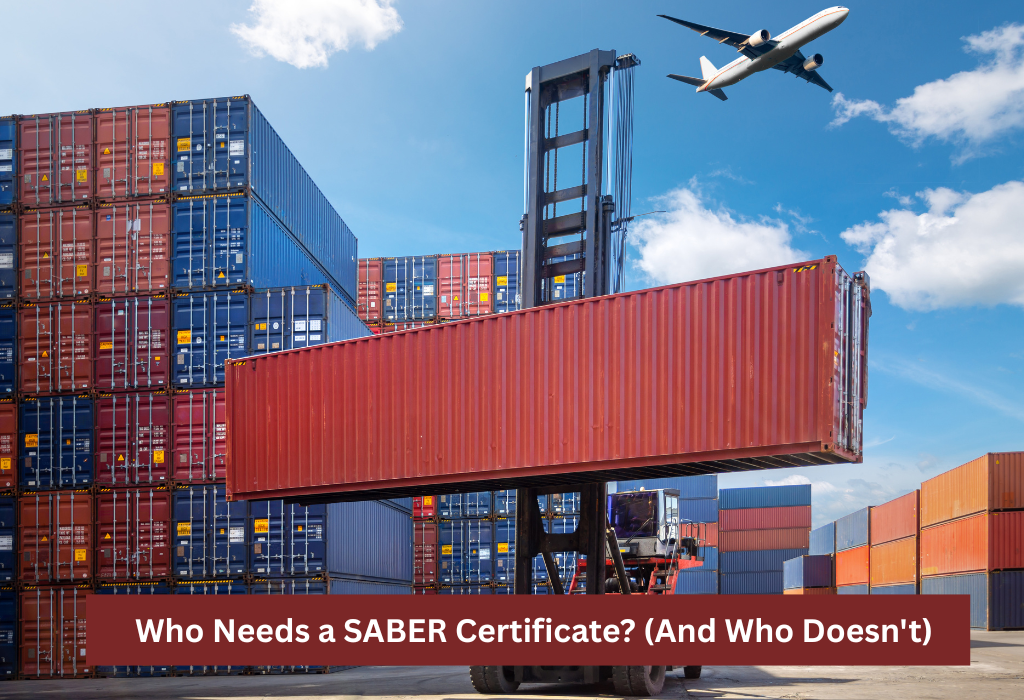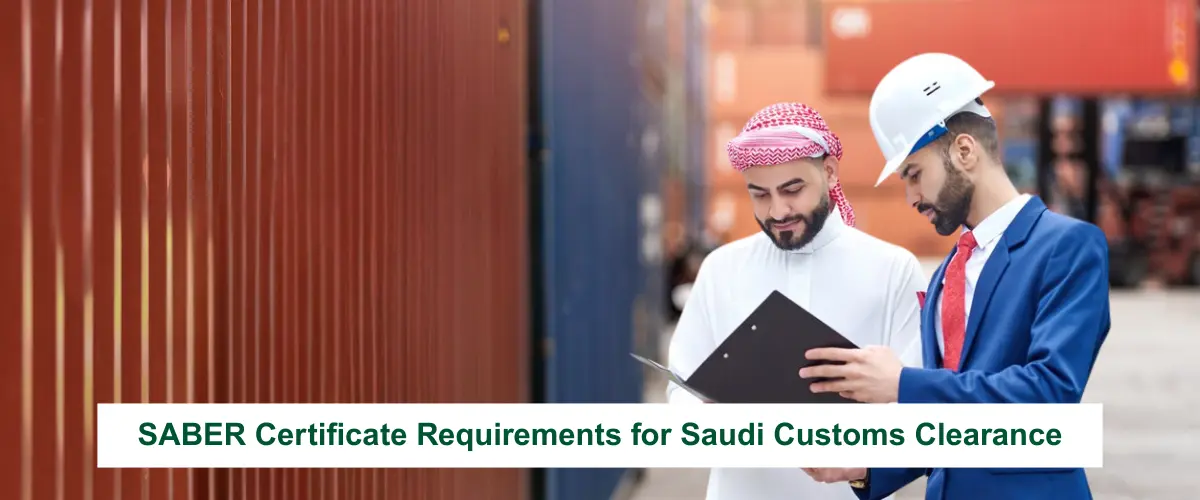For any business importing goods into Saudi Arabia, encountering the term “SABER Certificate“ at customs is inevitable. Introduced by the Saudi Standards, Metrology and Quality Organization (SASO), this product conformity program acts as the Kingdom’s first line of defense against substandard or unsafe imports.
Why This Matters to Importers
- Since 2019, 100% of regulated products (from children’s toys to electrical appliances) require SABER certification before arriving at Saudi ports.
- Without it:
- Shipments face immediate rejection at Dammam/Jeddah ports
- Businesses incur daily storage fees
- Risk blacklisting from future imports
Beyond regulations, SABER serves as:
- Consumer Protection: Prevents flood of counterfeit smartphones (a 60% reduction since 2020)
- Business Enabler: Companies with valid certificates clear goods 5x faster than competitors
- Economic Safeguard: Supports Saudi-made products by ensuring import quality parity
Who Needs a SABER Certificate? (And Who Doesn’t)

Navigating Saudi Arabia’s product compliance landscape can feel overwhelming, but knowing exactly which goods require SABER certification saves businesses from costly delays and penalties.
Products That Always Need SABER
The following categories must obtain certification before arriving at Saudi ports:
- Electronics & Appliances
- Mobile phones, laptops, chargers
- Home appliances (AC units, microwaves)
- Children’s Products
- Toys (with GCC Conformity Marking)
- School supplies (backpacks, lunchboxes)
- Construction Materials
- Pipes, cement, steel bars
- Food Contact Items
- Plastic containers, kitchenware
- Paper packaging
Surprising Exemptions
While SABER covers most consumer goods, these exceptions apply:
- Military/Defense Equipment (Handled by MODA)
- Pharmaceuticals/Medical Devices (Regulated by SFDA)
- GCC-Made Products (If already bearing G-Mark certification)
The Cost of Non-Compliance
Attempting to bypass SABER requirements leads to:
- Immediate Shipment Hold (Avg. 14-30 days for resolution)
- Financial Penalties:
- First offense: 25% of shipment value (max SAR 50,000)
- Repeat violations: Double fines + importer blacklisting
- Hidden Costs:
- Storage fees at ports (SAR 300-500/day)
- Lost customer trust
The Complete SABER Certification Process
Obtaining your SABER certificate requires careful preparation and understanding of Saudi Arabia’s product compliance system. Here’s the straightforward process successful importers follow.
Firstly, confirm your product needs certification by checking its HS code on the official SABER portal (saber.sa). Most consumer goods like electronics, toys, and construction materials require certification, while military and medical products follow different regulations.
Step 1: Testing and Documentation
All products must undergo testing at SASO-approved laboratories before application. For example:
- Electronics need IEC safety tests
- Children’s toys require chemical and physical safety evaluations
- Food containers must pass migration testing
Gather these essential documents:
- Clear product photos showing labels and safety marks
- Detailed technical specifications
- Valid test reports from accredited labs (less than 2 years old)
- ISO 9001 or equivalent quality certificates
Step 2: Portal Registration
Create your account on the SABER SA platform (saber.sa). International companies must appoint a Saudi-based representative to complete registration. The system will automatically link with SASO’s product database and ZATCA’s customs network.
Step 3: Application Submission
Upload all prepared documents through the portal. Pay special attention to:
- Image quality (many applications get rejected for blurry photos)
- Document validity periods
- Complete technical descriptions
Step 4: Payment and Processing
Fees range from SAR 300 to 3,000 depending on your product’s risk category:
- Low-risk items like paper products: SAR 300-800
- Medium-risk like kitchenware: SAR 800-1,500
- High-risk like children’s toys: SAR 1,500-3,000
Processing typically takes 3-7 working days, though you can pay 25% extra for 48-hour fast-track service. Some complex products may require up to 14 days if manual inspection is needed.
Step 5: Certificate Receipt and Validity
Once approved, your certificate will be available on the portal with validity periods of:
- 3 years for low-risk products
- 2 years for medium-risk
- 1 year for high-risk items
Navigating SABER Certification Challenges: Practical Solutions
Even experienced importers face hurdles with SABER certification. Here’s how to avoid the most common pitfalls and keep your shipments moving smoothly:
Top Reasons for Rejection (And How to Fix Them)
- Incomplete or Expired Test Reports
- Problem: SASO rejects 35% of applications due to:
- Tests from non-accredited labs
- Reports older than 2 years
- Solution:
- Use SASO-approved labs like:
- SGS Saudi Arabia (for consumer goods)
- TUV Rheinland (for electronics)
- Request dual testing for GCC markets to save time
- Use SASO-approved labs like:
- Problem: SASO rejects 35% of applications due to:
- HS Code Misclassification
- Problem: Wrong codes trigger automated rejections
- Solution:
- Verify codes via ZATCA’s Tariff Explorer
- Product Photo Issues
- Problem: 20% of rejections cite:
- Blurry/low-res images
- Missing Arabic labels in photos
- Solution:
- Submit high-res (4K) photos showing:
- Safety marks
- Branding
- All sides of packaging
- Submit high-res (4K) photos showing:
- Problem: 20% of rejections cite:
How to Prevent Costly Delays
- Timing Is Everything
- Start the process 3 weeks before shipping
- Account for:
- Lab testing (5–7 days)
- SASO review (3–7 days)
- Work With Experts
- Local customs clearance agents can:
- Fast-track applications
- Resolve disputes in Arabic
- Local customs clearance agents can:
- Double-Check Fees
- Underpayment causes application freezing
- Use SABER’s fee calculator
SABER Updates: What Importers Must Know
Saudi Arab’s SABER system continues to evolve. Here are the critical changes affecting your compliance strategy:
1. Expanded Product Coverage
- 200+ New HS Codes now require certification, including:
- Smart home devices (e.g., IoT controllers)
- Eco-friendly packaging (biodegradable materials)
- Cycling equipment (helmets, child bike seats)
2. Digital System Upgrades
- Auto-Sync with Fasah Customs
- SABER certificates now automatically appear in ZATCA’s clearance system
- Eliminates manual document uploads for approved goods
- Blockchain Verification Pilot
- Tamper-proof test reports for high-risk categories.
3. Stricter Enforcement
- New Penalty Triggers:
- HS Code “Gaming” (misclassifying high-risk as low-risk) → 2x standard fine
- Late Renewals (post-expiry applications) → 15% surcharge
- Good News:
- 10% fee reduction for Saudi-made inputs in manufacturing
Need SABER Certification Without the Headache?
Navigating Saudi Arabia’s SABER certification process may seem daunting, but it’s ultimately your passport to one of the Middle East’s most lucrative markets. With evolving regulations, digital integrations, and stricter enforcement, staying compliant isn’t just about avoiding penalties—it’s about securing your place in Saudi Arabia’s thriving import ecosystem.
At Radhi Custom Clearance Co., we understand the challenges importers face. Our team of Saudi compliance specialists will help you in SABER certification swiftly and seamlessly. We don’t just process paperwork—we build strategic partnerships to keep your shipments moving and your business growing.
Take the next step today: Contact our experts for a free consultation and discover how we can help.


Add a Comment